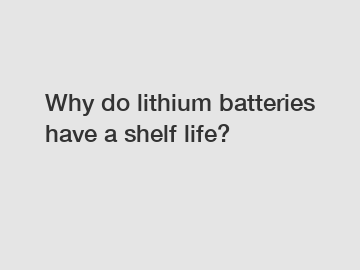Why do lithium batteries have a shelf life?
Mar. 26, 2024
Lithium-ion batteries have revolutionized the way we power our everyday devices, from smartphones and laptops to electric vehicles and power tools. These rechargeable batteries have become the go-to choice for many industries due to their high energy density and long lifespan. However, despite their many advantages, lithium batteries do have a shelf life. But why is that?
To understand why lithium batteries have a shelf life, we first need to understand how they work. Lithium-ion batteries contain a cathode (positive electrode), an anode (negative electrode), and an electrolyte. When the battery is charged, lithium ions move from the cathode to the anode through the electrolyte, storing energy in the process. When the battery is discharged, the ions move back to the cathode, releasing energy that can be used to power a device.
Over time, the materials in the battery undergo chemical reactions that can degrade its performance. One common cause of degradation is the formation of solid electrolyte interphase (SEI) on the surface of the anode. This layer can actually improve the battery's performance by acting as a barrier that prevents further reactions between the electrolyte and the anode. However, over time, the SEI layer can become unstable and lead to capacity loss.

Another factor that affects the shelf life of lithium batteries is their self-discharge rate. Even when not in use, lithium batteries will slowly lose their charge over time due to chemical reactions within the battery. This self-discharge rate can vary depending on the temperature and state of charge of the battery. Storing a lithium battery at high temperatures or at full capacity can accelerate the self-discharge rate and shorten its lifespan.
One of the biggest factors that can affect the shelf life of a lithium battery is the number of charge cycles it has undergone. Each time a battery is charged and discharged, it causes stress on the electrodes and electrolyte, leading to degradation over time. Most lithium batteries are rated for a certain number of charge cycles, typically around 500 to 1000 cycles, before their capacity starts to significantly degrade.
Explore more:Energy
Is it worth buying the top solar panel converter at its current price?
Everything You Need to Know About 5kw Inverters
48v Solar Inverter: Your Guide to Maximizing Efficiency and Savings
Discover the Best Inverter Set for Home Price - Your Ultimate Guide!
Top 5 12V Off Grid Inverters Revealed
The Ultimate Guide to 12V Solar Inverters: Explained and Demystified
In addition to these factors, the overall design and quality of the battery can also play a role in its shelf life. Cheaper or lower-quality lithium batteries may degrade faster due to manufacturing defects or impurities in the materials used. Proper storage and usage of the battery can also impact its lifespan. Storing a lithium battery at a high temperature or in a fully discharged state can cause irreversible damage that can shorten its shelf life.
So, what can you do to extend the shelf life of your lithium batteries? First and foremost, it's important to store your batteries properly. Keep them in a cool, dry place away from direct sunlight and extreme temperatures. If you're not going to be using a lithium battery for an extended period of time, it's best to store it at around 50% charge to minimize self-discharge.
Another way to extend the shelf life of your lithium batteries is to avoid deep discharges. Allowing a lithium battery to fully discharge can cause irreversible damage to the electrodes, leading to capacity loss and reduced performance. It's best to recharge your battery before it reaches a low state of charge to prolong its lifespan.
Lastly, following the manufacturer's guidelines for charging and usage can also help extend the shelf life of your lithium batteries. Avoid fast charging your battery, as this can generate excess heat and stress on the electrodes. Using a charger that is specifically designed for your battery can also help ensure that it is charged and discharged properly, avoiding damage that can shorten its lifespan.
In conclusion, while lithium batteries have many advantages, they do have a shelf life due to the complex chemistry and physics involved in their operation. Factors such as self-discharge, charge cycles, and overall battery design can all impact the lifespan of a lithium battery. By following proper storage and usage practices, you can help extend the shelf life of your lithium batteries and get the most out of your devices.
If you are looking for more details, kindly visit lithium storage battery for Data center backup power, 3 string inverter, Marine AC-coupled inverter.
Recommended article:Is the future of home energy storage?
5 Must-Have Features in a bipv technology supplier
What are the benefits of using OEM Screwfix outdoor solar wall lights?
How to Integrate a Solar PV System into a Building
How do I install a led solar outdoor waterproof wall light?
FLEX Stacked Lithium—Power That Changes Everything
When to Use bipv technology supplier?
355
0
0
Next: None
Related Articles










Comments
All Comments (0)